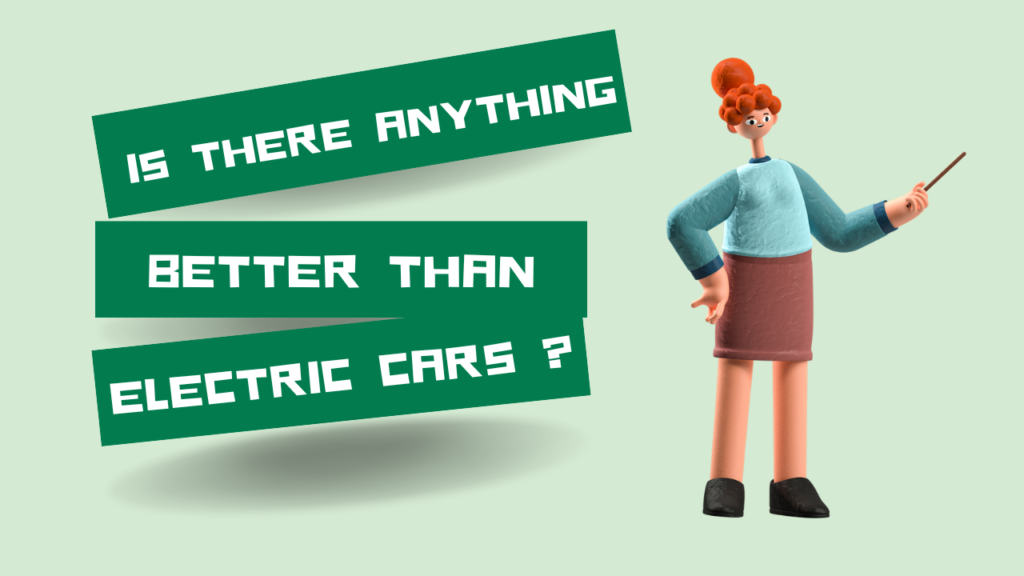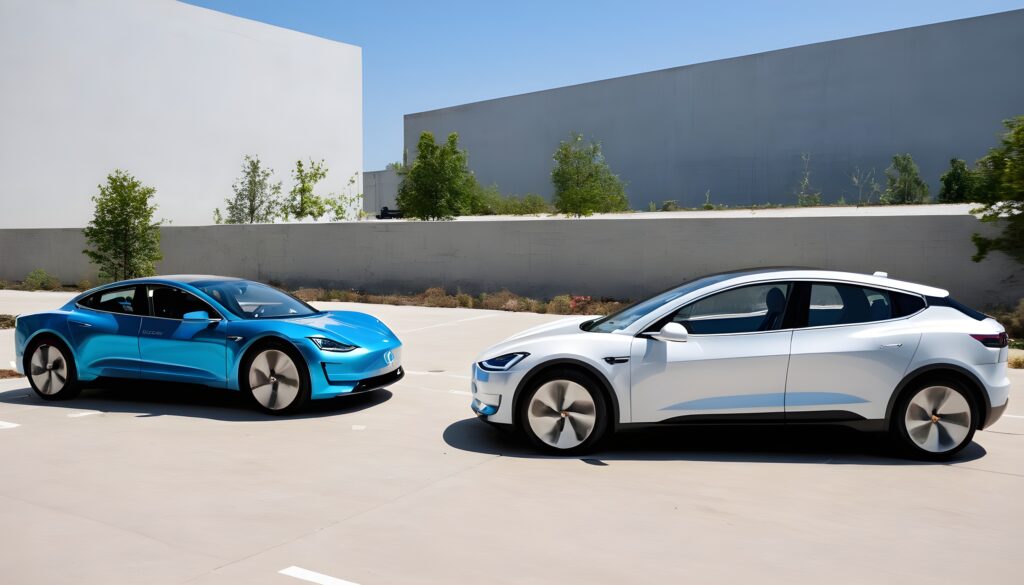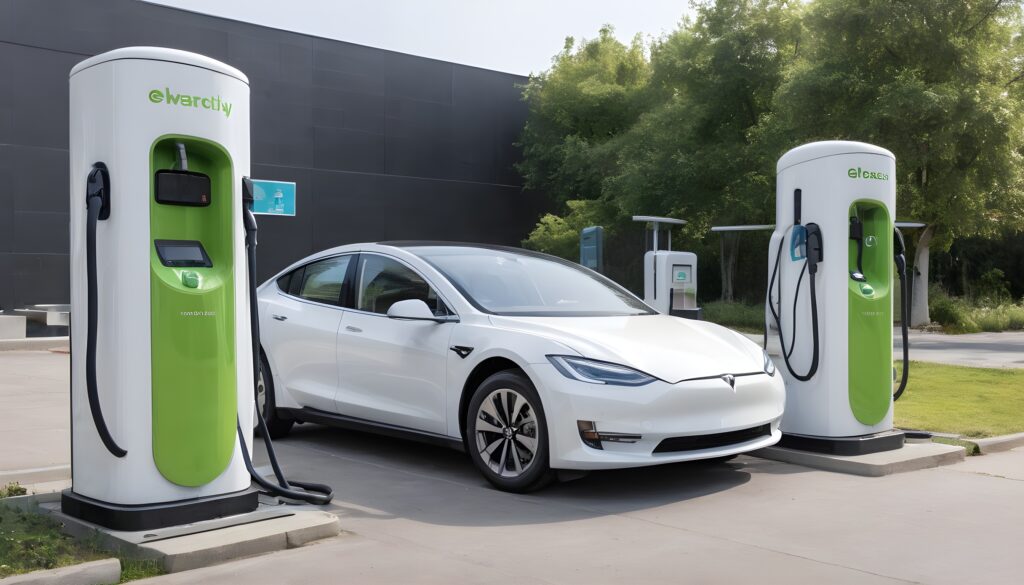
Table of Contents
Introduction
The current wave of innovation in transportation has pushed electric cars to the forefront and challenged the concept of traditional vehicles. Is there anything better than electric cars In this piece, we explore the various factors that make electric vehicles not only a sensible substitute but also a unique development in the automotive sector.

Is there anything better than electric cars?
Although electric vehicles are excellent at saving energy and lowering emissions, there isn’t just one “better” choice. Although they have zero tailpipe emissions and quick refueling, hydrogen fuel cell vehicles are not well-supported by infrastructure. Though sustainability depends on feedstock sources, biofuel or synthetic gasoline alternatives may be able to address emissions concerns within current engine technologies.
In the end, the “best” choice will rely on your priorities. If you value affordability, convenience, emissions, or the state of the infrastructure now in place, look into the technology that best fits your needs.
Is a petrol vehicle better than an electric vehicle in 2023?
Whether a petrol vehicle is “better” than an electric vehicle (EV) depends on your priorities and circumstances. In 2023, EVs offer advantages like lower running costs, environmental benefits, and potentially smoother performance. However, petrol cars are generally cheaper upfront, have wider ranges, and refuel faster.
Consider your typical driving distances, access to charging, budget, and environmental values to make the best choice for you.
Are hydrogen cars as fast as electric cars?
Modern hydrogen vehicles can accelerate and reach top speeds that are comparable to those of electric vehicles. High-performance models of both technologies, such as the over 150 mph Tesla Model S Plaid and the Toyota Mirai, are available. When it comes to the selection of high-performance models that are currently available, electric vehicles have the advantage. Recall that factors other than the power source itself that affect speed include horsepower and vehicle design.
Can electric cars become significantly more efficient?
Yes, there is still a lot of space for efficiency growth in electric vehicles. Experts estimate that efficiency will rise by 20–50% in the next ten years due to factors like lighter materials, better battery technology, smarter charging infrastructure, and energy recovery during braking. This increases the competitiveness and environmental friendliness of electric vehicles by enabling longer ranges, quicker charging times, and possibly lower prices.
Is an electric car faster than a vehicle that uses fuel? Why?
Because their electric motors produce instant torque, electric cars can accelerate faster than gasoline-powered vehicles. This implies they leave many gasoline-powered cars in the dust as they accelerate more quickly, especially at lower speeds. But because of their continuous power delivery, gas-powered cars tend to perform better at top speeds.
Therefore, fuel-powered vehicles may outperform electric vehicles on the Autobahn even though they might win the drag race from a stop.
Does it cost more to make an electric car than a gas one?
Currently, producing an electric car is more expensive than producing a gas car, mostly because of the costly batteries. But as technology advances and battery production increases, the gap is closing quickly. Furthermore, the fact that electric cars have fewer moving parts could result in lower manufacturing costs over time.
In the end, the situation is complicated and varies depending on particular car models and battery types, but the trend suggests that the cost of producing electric cars will decrease in the future.

What’s better, an electric car or a biofuel car?
While both electric and biofuel vehicles have benefits, electric vehicles currently have the greatest environmental impact. While the tailpipe emissions of biofuels are lower than those of gasoline, they are still emissions of carbon dioxide. However, the production of electric cars can be resource-intensive and they depend on clean electricity, which isn’t always available.
Uncertain lifecycle emissions and possible conflicts with land use are among the disadvantages of biofuels. The “better” option ultimately comes down to personal preferences and situational factors. Electric vehicles win out today if reducing emissions is your main priority, but biofuels may be a viable choice in areas with limited access to clean electricity or where sustainable production techniques are established.
Do all electric cars have the same power?
No, just like gasoline-powered vehicles, electric cars are available in a variety of power levels. This depends on a number of variables, including the intended use, battery capacity, and motor size. While some performance-oriented models emphasize efficiency with smaller motors for longer range, others prioritize horsepower for rapid acceleration.
Therefore, there is an option with just the right amount of power for your needs, whether you’re looking for a sporty EV or an economical commuter.
Is an electric car worth it if you don’t drive much?
Your driving habits and priorities will determine whether or not an electric car is worth it for you. If you drive fewer than 10,000 miles annually, the higher initial cost and delayed depreciation of electric vehicles (EVs) may outweigh the potential government incentives and lower fuel costs.
On the other hand, an EV can be perfect for you if you value the environment and you drive short distances most of the time because they are more efficient in stop-start traffic and require less maintenance. To make the best choice, take into account your driving requirements, charging options, and budget.
Is the range of electric vehicles better than gasoline cars?
No, gas-powered vehicles can travel 413 miles on a single charge, whereas the average range of an electric vehicle (EV) is only 217 miles. However, the distance is closing quickly! More than 300 miles can be covered by new models, and battery technology is constantly advancing. Long trips may need advance planning, but EVs are great for daily commutes and are getting better at road trips as well. Keep in mind that range varies depending on the weather and driving style, so take your needs into account.
Is the future of cars all electric? Are there any alternatives?
Even though they will likely dominate the auto industry going forward, electric vehicles are not the only option. Clean, long-term alternatives come in the form of hydrogen fuel cells, and research is being done on biofuels made from sustainable sources.
With advancements in efficiency and carbon capture technologies, gasoline engines may still be used. In the end, a variety of technologies will probably be used in cars, with the optimal option relying on elements like cost, environmental effect, and infrastructure.

Conclusion: Is there anything better than electric cars?
To sum up, the advent of electric vehicles represents more than just a change in driving styles. It signifies a paradigm shift in favor of transportation that is technologically sophisticated, efficient, and sustainable. Electric cars continue to lead the automotive industry in terms of innovation and provide a strong substitute for conventional automobiles.
FAQs: Is there anything better than electric cars?
1. What are the advantages of electric cars over traditional vehicles?
Electric cars offer numerous benefits, including lower emissions, reduced operating costs, and a quieter, smoother driving experience.
2. How does the charging infrastructure for electric cars work?
The charging infrastructure for electric cars involves various charging stations, each with different speeds, and can be easily accessed through mobile apps or navigation systems.
3. Are electric cars suitable for long-distance travel?
Yes, many electric cars now come with extended ranges, making them suitable for long-distance journeys. Charging networks continue to expand, providing more convenience for travelers.
4. What is the environmental impact of electric cars?
Electric cars contribute to a cleaner environment by producing fewer greenhouse gas emissions and reducing dependence on fossil fuels.
5. Are electric cars more expensive to purchase than traditional vehicles?
While the initial cost may be higher, electric cars often have lower operating and maintenance costs, making them cost-effective in the long run.
6. How long does it take to charge an electric car?
Charging times vary depending on the charging station and the vehicle. Fast-charging stations can provide a significant charge in a relatively short time, while home charging may take longer.
7. What incentives or rebates are available for electric car buyers?
Many governments offer incentives, such as tax credits or rebates, to encourage the adoption of electric vehicles. Check with local authorities for specific details.
8. Can I install a home charging station for my electric car?
Yes, home charging stations are available, and they can be installed by professionals. They provide convenient charging options for electric car owners.

obviously like your website but you need to test the spelling on quite a few of your posts Several of them are rife with spelling problems and I to find it very troublesome to inform the reality on the other hand Ill certainly come back again
Pingback: Shocking Truth: Why is Toyota not making electric cars? (10 Questions Answered!) - mandblogs.com
For the past few days I’ve been frequently checking out this amazing website, they have sensational content for subscribers. The site owner has a real talent for engaging readers. I’m impressed and hope they maintain their wonderful efforts!
Good day! mandblogs.com
Did you know that it is possible to send message absolutely legitimately? We tender a commercial offer through feedback forms using a new method.
Feedback Forms’ messages are thought of as significant thus avoiding the categorization of them as spam.
We are offering you an opportunity to try our service without charge.
We shall send up to 50,000 messages to you.
The cost of sending one million messages is $59.
This message was automatically generated.
Please use the contact details below to get in touch with us.
Contact us.
Telegram – https://t.me/FeedbackFormEU
Skype live:feedbackform2019
WhatsApp +375259112693
WhatsApp https://wa.me/+375259112693
We only use chat for communication.
Pingback: What happens when an ev runs out of charge (and How to Avoid It!) with 8 More QNA - mandblogs.com
консультации юристов [url=https://intrem.ru/interer/besplatnye-yuridicheskie-konsultatsii-v-moskve-i-moskovskoj-oblasti-vash-gid-v-mire-pravosudiya/]консультации юристов[/url] .